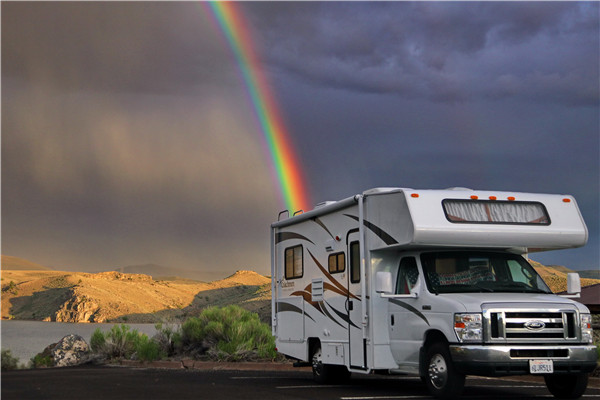
Mobile homes and caravans are showcased at Caravan Salon Dusseldorf 2015 in Germany. (Photo by Xu Lin/China Daily)
This year's Caravan Salon Dusseldorf, one of Europe's largest exhibitions of mobile homes and caravans, was attended by not just the residents of the German city of Dusseldorf, but also those from other parts of the country and the Continent. The show was held from Aug 29 to Sept 6.
Many middle-aged couples and elderly people brought their dogs along to the fair, where some 130 companies set up stalls to show and sell their recreational vehicles.
While RVs are common in Europe for leisure travel, foreign companies are now looking at China as a market with potential.
"RVs are not only about business, but also about dreams and lifestyles. China is perfect for them due to its beautiful scenery, vast land and good roads," says Stefano Bonometti based in Italy, the area manager in China for German brands Hobby and Fendt, owned by Harald Striewski.
Chinese are fond of exploring nature, he adds.
"If RVs are popular in other parts of the world, why not in China?"
In 2010, the two brands entered the Chinese market as an early bird, and began to promote and distribute their German-made RVs of Hobby and Fendt brands through agents in Beijing, Shanghai and other cities. Since then sales of the two brands have increased every year, Bonometti says.
"Caravaning means a change of lifestyle," he says, adding that while China is a big market, it will require time to realize its potential in this sector.
The caravans, mobile homes or trailers offer necessities such as kitchen, sofa and TV, and for Chinese working in the big cities, there's scope for fun on weekends-sports, playing cards, barbecue, drinking and more. Special RV models, with sockets and air conditioning, have also been produced for the Chinese market, in a bid to meet local customer demand, Bonometti says.
Chinese campsites usually don't have a shower, which is why the caravans are equipped with small bathrooms, and have more water storage space given the lack of refilling facilities at natural sites here.
For such foreign companies, the main target clients in China are the middle-aged people, who have the money and the aspiration to indulge in RVs.
"Our strategy is to participate in the early stages of the Chinese market. We love what's happening there, with the construction of campsites and infrastructure," says Hans Posthumus, vice-president of marketing for Alois Kober GmbH. This German company makes components for caravans and trailers.
Posthumus expects foreigners traveling in China to rent caravans and trailers to tour the country in the next few years.
"The Chinese market has great potential," says Joa-chim Schaefer, managing director of Messe Dusseldorf GmbH in Germany, the organizer of the Caravan Salon Dusseldorf.
He says the government and some tourism agencies in China are promoting RVs. As more and more campsites and facilities are being built in China, maybe more people will try this out.
According to the data of China Association of Automotive Manufacturers in 2015, there were only about 40 developed campsites in China in 2010, and the number increased to nearly 500 this year and is expected to reach 10,000 by 2020.
Schaefer says in Europe, manufacturers are designing low-cost, lightweight RVs for young families.
But the market there is changing. A decade ago, traveling to the woods in RVs was hot. Now, historical sites and cultural events are fashionable.
Ye Shengji, deputy secretary-general of China Association of Automotive Manufacturers, says some Chinese companies are making RVs in collaboration with foreigners, and import components such as air-conditioning units, toilets and refrigerators.
RVs have different target customers at different stages of the industry. In Europe, for instance, most buyers are older couples who have the time and money. In China, it's more trendy among middle-income people, according to Ye.
Ye and representatives of more than 60 other Chinese RV firms also visited the Dusseldorf fair to learn from their European counterparts.
China has strict rules about putting up a trailer on the road such as license registration and a test of driving skills, so large trailers aren't expected to become big in the country. But, trailers weighing less than 700 kilograms stand a better chance, Ye says.
He says the quality of campsite construction in China varies widely and lacks standards, including for safety, although in suburban areas of big cities, it tends to be better.
The State Council, China's cabinet, issued new guidelines for self-driving caravans and campsite construction in August. It asked that proper procedure be followed for the development of such sites, camping accommodation registration, safety and rescue systems.


















































